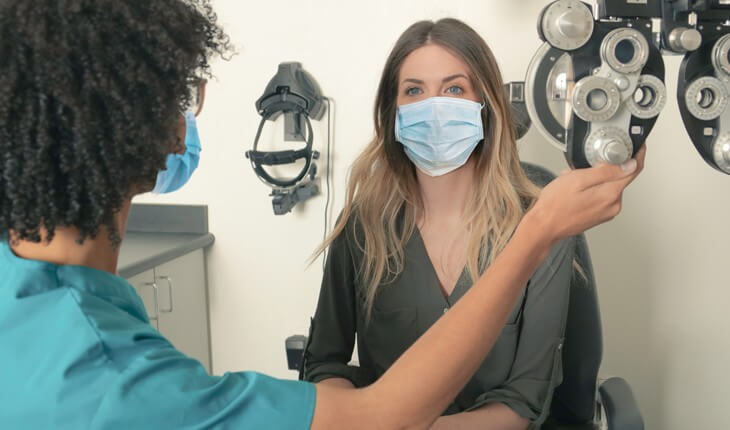It’s undeniable – eye sight changes when you get older. Find out when you need an eye exam and how you can get vision coverage.

Is it getting more difficult to read soup can labels at the grocery store, or is the text on the computer screen a little more fuzzy than it used to be? Millennials may not put themselves into the category of people needing special glasses to read the fine print. But that, along with their vision, may been changing in 2021.
This year, the first group of millennials will turn 40. And when most people hit this age, vision begins to change. It may be more difficult to focus on object up close. You may need more light to see as well as you used to, or you may have problems with glare from headlights or the sun. Or your eyes may get drier – or more watery.
These changes are normal and often inevitable, like aging itself. Here is what to expect, what to look out for, and how to get the care you need to make sure your eyes stay healthy for years to come.
What are some common eye problems as you get older?
Presbyopia
Presbyopia is the inability to focus on near objects. With age, people may notice that reading from a book or a phone becomes more difficult. That’s because the lens of the eye becomes less flexible and can’t easily shift focus between objects that are far away to those that are closer.
Many people with presbyopia may get headaches or “tired eyes” after long bouts of reading or working on a computer. And it’s why many over the age of 40 start needing to wear reading glasses.
If presbyopia starts sneaking up on you, speak to your eye doctor as there are several options your eye doctor can provide to help you address these vision changes. These include:
- Contact lenses, including bifocals
- Prescription eyeglasses, including bifocals and trifocals
- Over-the-counter reading glasses
- Laser surgery
Dry eyes
When your tear glands don’t make enough or low-quality tears, dry eyes can happen. You may experience itching, burning or even some loss of vision. Using a humidifier in your home or special eye drops that simulate real tears can offer some relief. Make sure you talk to your provider to confirm there are no other causes of your dry eyes.
When should you be concerned about your vision?
Adults over the age of 40 are at the greatest risk for eye diseases. Be aware of some warning signs of a serious eye health problem:
- Frequent changes in how well you can see
- Seeing flashers and floaters – In most cases, an occasional flasher or floater in your field of vision is usually normal as we age, but if you see a lot of them, contact your doctor.
- Loss of peripheral or side vision
- Seeing distorted images, like straight lines that appear wavy or an empty area in the center of your vision
- Double vision
- Eye pain
Here are the most common eye diseases that affect individuals over the age of 40:
- Cataracts: cloudy areas over the lens
- Diabetic retinopathy: in this this complication from diabetes, the high blood sugar levels cause damage to the blood vessels in the retina. These blood vessels can then swell and leak. They may also close off, stopping the blood flow.
- Glaucoma: increased pressure inside the eye that can damage the optic nerve
- Macular degeneration: gradual breakdown of light-sensitive cells in the eye, distorting vision
When should you see a doctor?
For people age 40+, the American Optometric Association (AOA) recommends a comprehensive eye examination with an optometrist or ophthalmologist at least every two years. (However, if you wear contact lenses, you should see your eye doctor every year). A regular eye exam not only can help a doctor correct your vision problems, but it can also detect potential medical issues, including hypertension and diabetes, early on.
If you have difficulty seeing or have other warning signs, you should go more frequently. Some people have health or work issues that make them particularly at risk for problems:
- Chronic, systemic conditions such as diabetes or high blood pressure
- A family history of glaucoma or macular degeneration
- A highly visually demanding job or work in an eye-hazardous occupation
- Health conditions related to high cholesterol, thyroid, anxiety or depression, and arthritis for which you take medications, which could cause vision side effects.
Once you’ve reached 65, the AOA recommends annual visits to an eye doctor.
How can Horizon benefits help?
Since most people will eventually need eye glasses or contact lenses, it makes sense to plan for the expenses that will follow. A low-cost vision plan from Horizon can help.
If you live primarily in New Jersey and are age 19 or older, a Horizon Vision plan can offer:
- Annual exams for as low as $10
- Savings on eyeglasses, sunglasses and disposable contact lenses (including mail-order)
- Laser-vision-correction discounts (up to 25% off)
- Low-vision services
Find out more about Horizon vision plans here.











